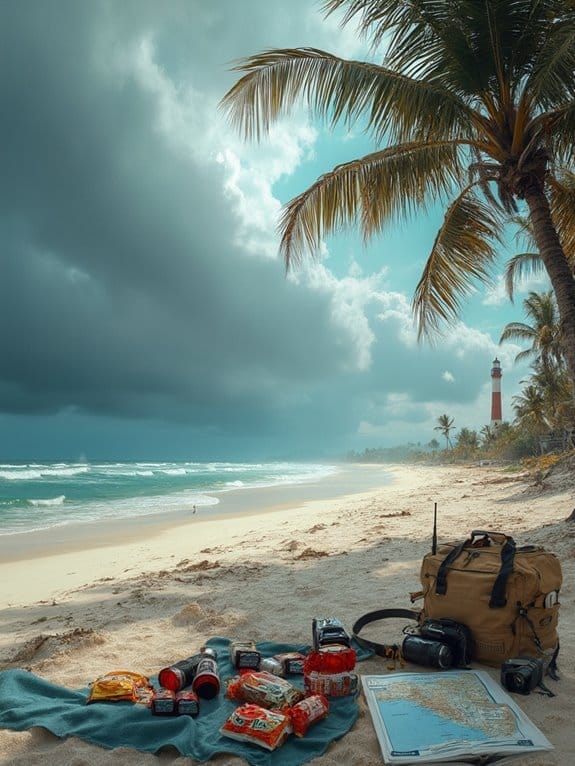Visiting Florida during hurricane season can be an adventure, but you've got to prepare! First, always check the weather with reliable sources like the National Hurricane Center. Look for inland spots like Orlando or Gainesville—they're usually safer and still packed with fun. Make sure you've got travel insurance, a solid emergency plan, and a kit with snacks and chargers, just in case. It's smart to book flexible accommodations too. And hey, if a storm rolls in, embrace the indoor activities—that's when you can catch those unique local vibes! Stick around, and I'll share more tips to keep you safe and savvy!
Key Takeaways
- Choose safer inland destinations like Orlando or Gainesville to minimize hurricane risk during your visit to Florida.
- Obtain comprehensive travel insurance that covers cancellations due to severe weather and review hurricane-related clauses.
- Monitor weather updates frequently through the National Hurricane Center and set alerts for real-time information.
- Create an emergency plan, share your itinerary with family, and identify local emergency services for safety.
- Be flexible with your travel plans and explore indoor activities during inclement weather to enhance your experience.
Understanding Hurricane Season
Hurricane season in Florida spans a critical six-month period from June 1st to November 30th, during which the threat of tropical storms and hurricanes increases considerably. You might be wondering, what causes these storms? Well, it's all about hurricane formation. When the warm air from the ocean meets cooler air, they mix like a bad cocktail, creating those powerful storms.
Now, let's talk storm categories. Hurricanes are ranked from category 1 to 5, with category 5 being the ultimate beast. If you've ever seen the aftermath of a hurricane, you know it's no joke. The winds can whip up to 157 mph, and that's just the start! Florida's southeast coastline and panhandle are hotspots for these storms, with cities like Miami and Tampa bearing the brunt. Historically, the state experiences a tropical storm or hurricane approximately every three years, highlighting the need for preparedness.
It's wild to think that Florida gets hit by a tropical storm or hurricane about every three years. With over 120 hurricanes recorded since 1851, you might feel a bit anxious about planning your visit. But don't worry! Understanding this season's ins and outs can help you enjoy Florida, even when Mother Nature's throwing a tantrum.
Preparing for Travel

When planning your trip to Florida during hurricane season, it's important to prepare adequately. First things first, keep an eye on weather forecasts and alerts. Rely on trustworthy sources like the National Hurricane Center or your favorite weather app. Staying flexible with your plans can save you from unexpected trouble!
Don't forget to secure thorough travel insurance. Look for a policy that covers cancellations or delays due to severe weather. Trust me, it's worth the peace of mind. You'll also want to pack smart. Create a detailed emergency plan, share your itinerary with friends or family, and make a list of emergency contacts.
As for packing essentials, store important documents in waterproof bags. Think portable chargers, flashlights, and non-perishable snacks. Toss in a disaster supply kit with batteries and any necessary medications. Oh, and consider packing necessities in your carry-on; you don't want to be rummaging through checked bags during a storm!
Lastly, choose accommodations wisely. Look for places with solid hurricane policies and emergency procedures. Comprehensive insurance will also help you navigate any financial challenges that arise when the winds start to howl. They'll be your safe haven when the winds start to howl. Safe travels!
Choosing Safe Destinations

While Florida offers plenty of attractions, choosing safe destinations during hurricane season is essential for a worry-free trip. You'll want to steer clear of the more vulnerable areas like Southeast Florida and the Florida Panhandle. Instead, consider heading inland to spots like Orlando, Gainesville, or Ocala. These cities are not only less prone to hurricanes but also have great local attractions that'll keep you entertained.
Orlando is a fantastic option! With its famous theme parks and a strong emergency management system, you can enjoy your vacation knowing you're in a safer area. Gainesville is another gem, known for its beautiful parks and vibrant culture, making it perfect for a relaxing getaway. Additionally, many of these inland areas have a lower frequency of hurricanes, providing even more peace of mind during your visit. Don't forget Leesburg; nestled in Central Florida's Lake County, it boasts lovely scenery and safe accommodations.
Choosing these inland locations means you can soak up the sun without the stress of storm surges or strong winds. Plus, you'll get to explore unique local attractions while enjoying a more laid-back atmosphere. So pack your bags and choose wisely—your peace of mind is worth it!
Monitoring Weather Updates
Staying informed about weather updates is crucial for anyone visiting Florida during hurricane season. You don't want to be caught off guard when a storm is brewing, right? The National Hurricane Center (NHC) is your best friend here, providing the latest info on tropical cyclones and forecasts. Check out their official website for real-time updates. And don't forget about the National Weather Service (NWS) for beach conditions and alerts!
Using weather apps on your phone can be a game-changer. They offer quick access to updates and notifications about anything from hurricane predictions to rip current warnings. Plus, these apps often boast impressive forecast accuracy, predicting storm paths up to two or three days in advance. With 60-85% chance of rain today, it's essential to keep an eye on local forecasts.
It's critical to monitor conditions frequently, as they can shift in the blink of an eye. Set your phone to get alerts from the NHC and NWS, and keep an ear out for local news. Trust me, you'll want to stay in the loop, especially when the wind starts howling and the skies turn ominous. Enjoy your trip, but always prioritize safety by keeping those weather updates close!
Emergency Preparedness Tips

As hurricane season approaches, it's essential to prepare for potential storms to keep yourself and your loved ones safe. First off, assess your risk based on where you're located. If you're in a high-risk area, developing a family emergency plan is a must. Map out your evacuation routes, safe zones, and have a communication method ready—nothing fancy, just a good ol' group chat or a designated meeting spot.
Next, prepare a disaster kit stocked with non-perishable food, water, batteries, and first aid supplies before June 1st. Don't forget to secure your home! Close windows, doors, and trim those tree branches that look like they could poke an eye out. Remember that major hurricanes rarely hit specific destinations, so staying informed about weather conditions is key.
Stay informed by checking resources like VISIT FLORIDA and signing up for emergency notifications. Having a list of important contacts—like your neighbor who knows first aid—can be a lifesaver. And let's not forget about your furry friends! Find pet-friendly shelters or arrange for them to stay with family outside the evacuation zone. With a little preparation, you'll be ready to weather any storm that comes your way.
Enjoying Florida Responsibly

Enjoying Florida during hurricane season can be a rewarding experience if you take the necessary precautions. First off, make sure you stay informed. Keep an eye on weather updates from reliable sources like VISITFLORIDA.com or the National Hurricane Center. You never know when a sunny day might turn stormy! Also, travel flexibility is key. Be ready to change your plans at a moment's notice; it could save you a lot of hassle.
When it comes to hurricane safety, don't ignore evacuation orders. If told to move inland, just do it! And while you're there, embrace indoor activities. There's plenty to explore, from museums to local eateries. Just remember to pack essentials, like extra medications, in case your stay gets extended thanks to Mother Nature. Additionally, be aware that hurricanes can cause severe damage even hundreds of miles from the coast, so always prioritize your safety.
Lastly, consider travel insurance. It's like a safety net for your vacation—covering trip cancellations due to severe weather. By planning ahead and being adaptable, you can enjoy Florida's beauty, even during hurricane season. So, grab your flip-flops and a good book, and get ready for some unforgettable adventures, rain or shine!
Frequently Asked Questions
What Should I Do if My Flight Is Canceled Due to a Hurricane?
If your flight's canceled due to a hurricane, check your travel insurance for coverage options. Stay informed about airline policies, and guarantee your hurricane preparedness includes flexible rebooking plans to minimize disruptions during your travels.
Are There Any Discounts for Booking During Hurricane Season?
While booking during hurricane season, you won't find specific discounts. However, over 60% of travelers prioritize hurricane insurance for travel safety. Focus on flexible cancellation policies instead, as they may offer some financial relief.
Can I Get a Refund for My Hotel During a Hurricane?
You might get a refund for your hotel if it's closed due to a hurricane, but check the hotel cancellation policies. Also, hurricane travel insurance could help if you purchased it before the storm warning.
What Activities Can I Do if It Rains During My Visit?
If it rains during your visit, you can explore indoor attractions like the Frost Museum of Science or the Salvador Dali Museum. There're also fun rainy day activities like escape rooms and cooking classes to enjoy!
How Can I Find Local Emergency Services While Traveling?
You'd think finding local resources would be easy, but during an emergency, it's essential to have emergency contacts ready. Keep handy hotlines like 911, and don't forget to check online for updates. Stay informed!





